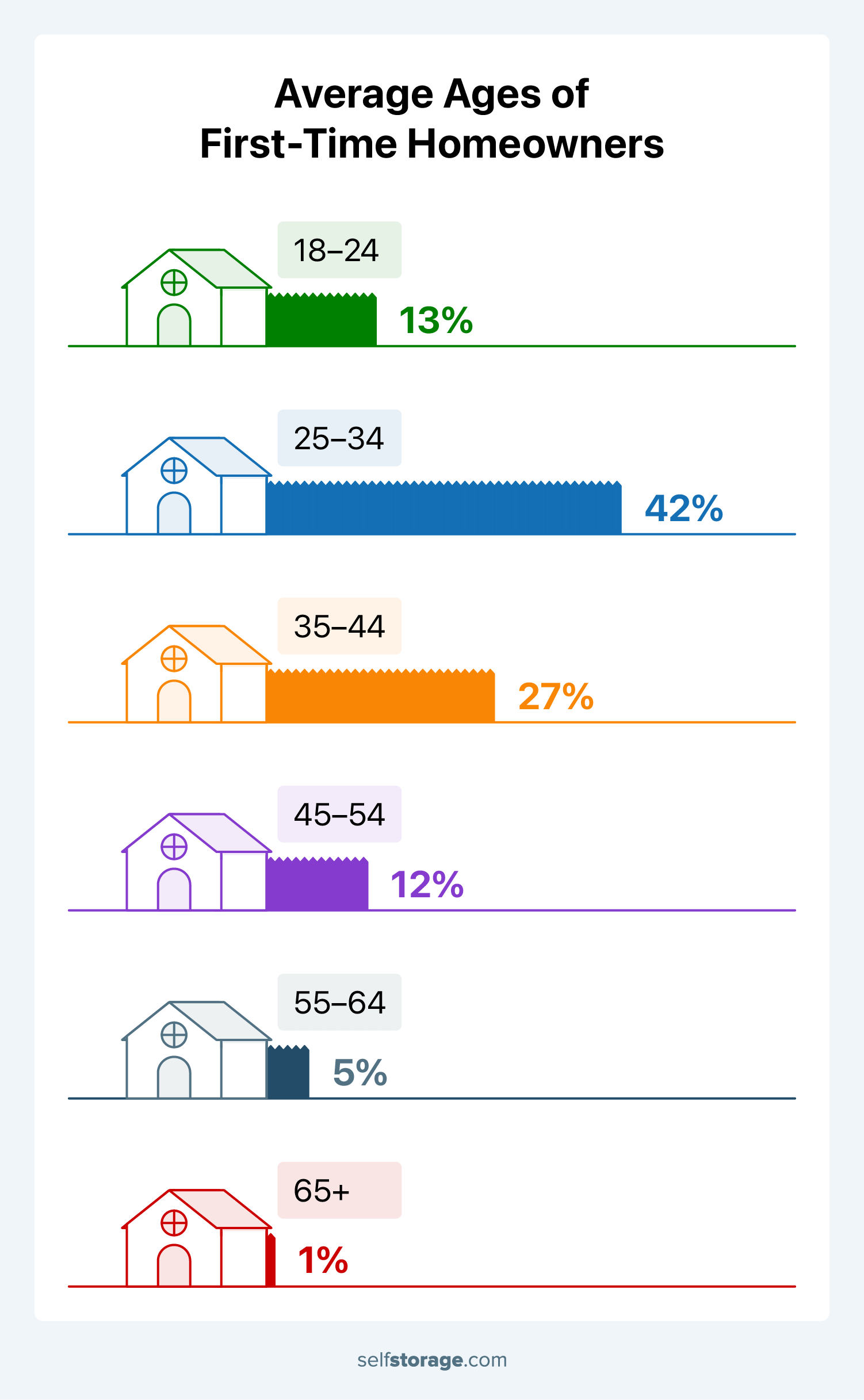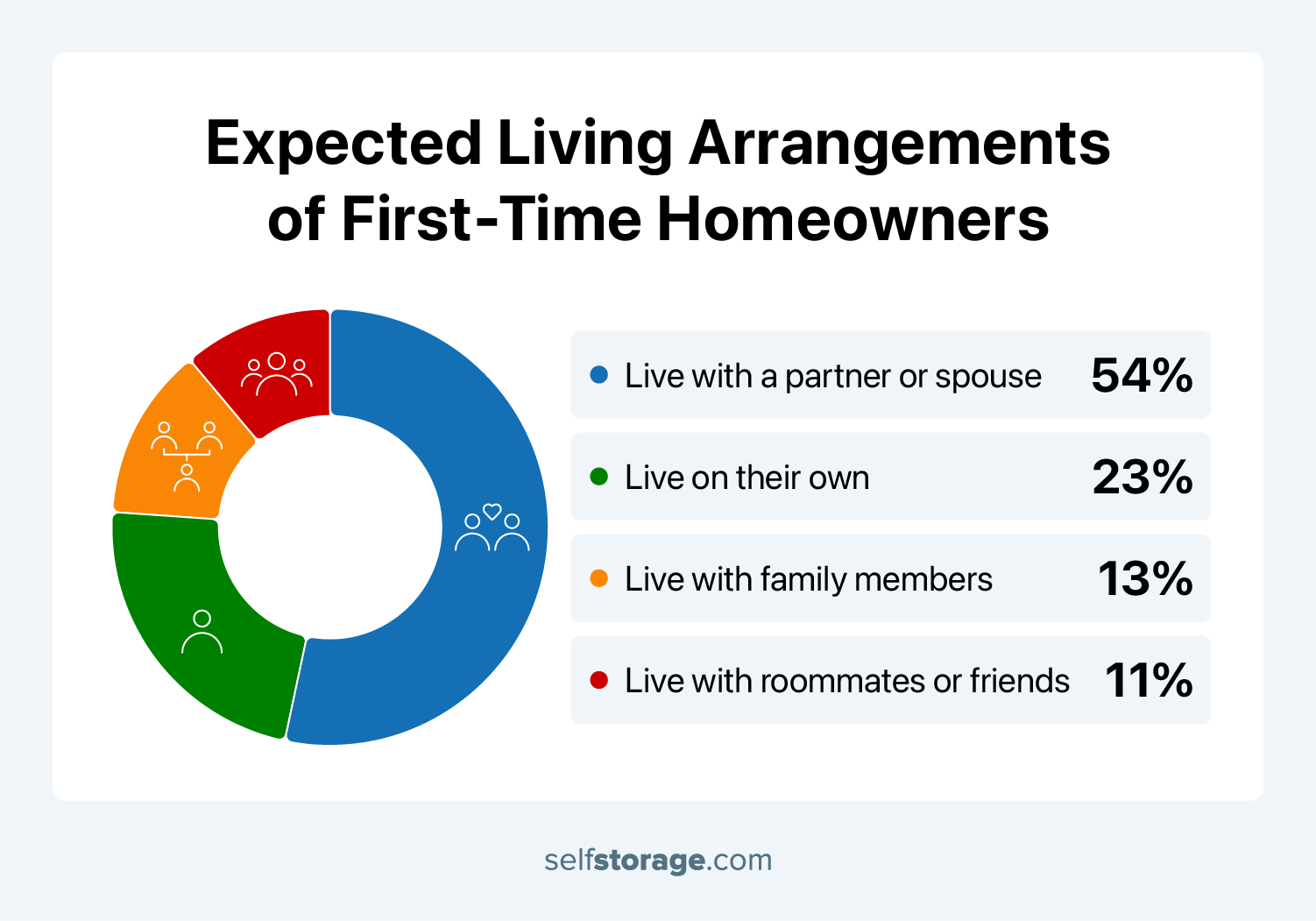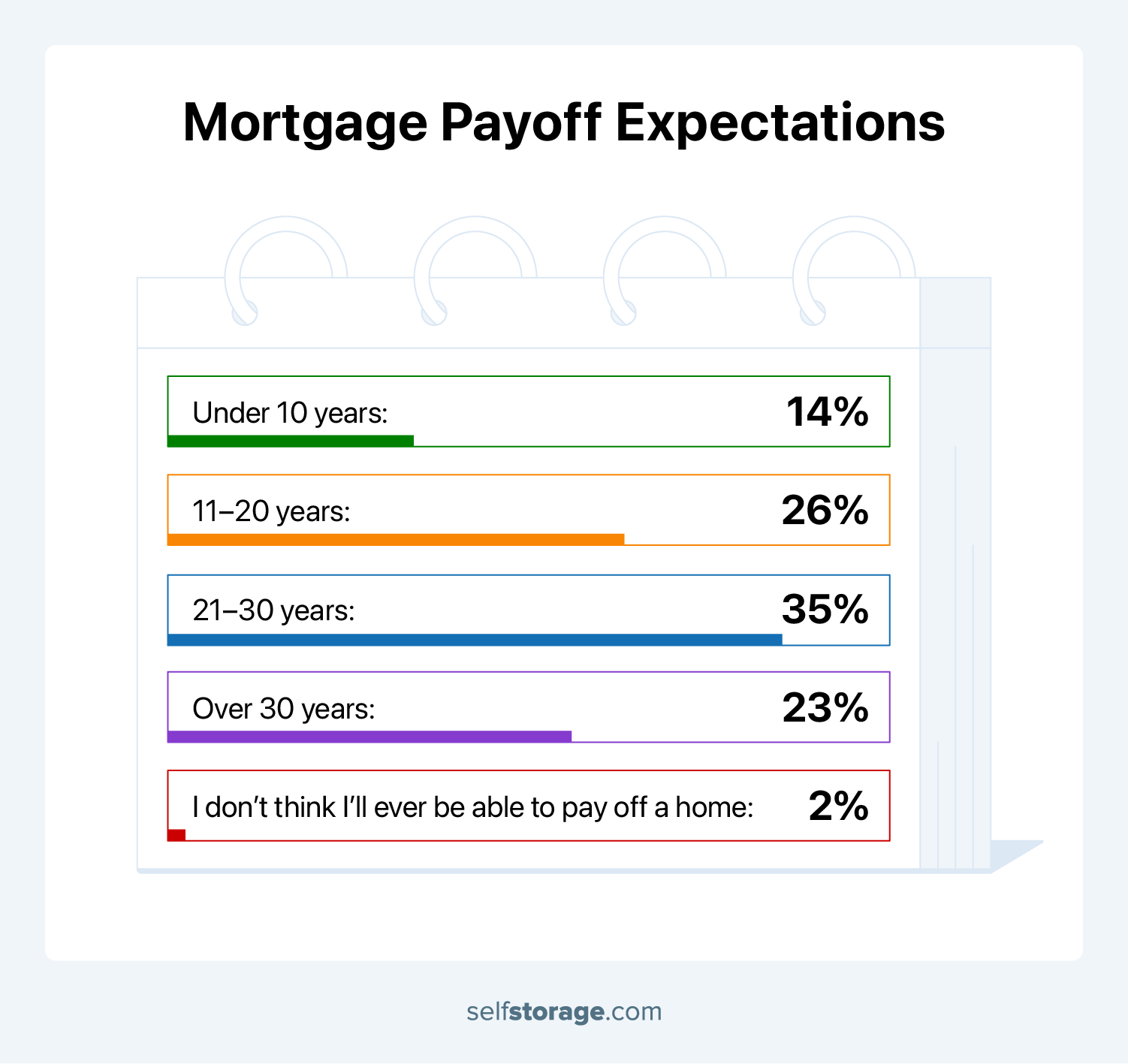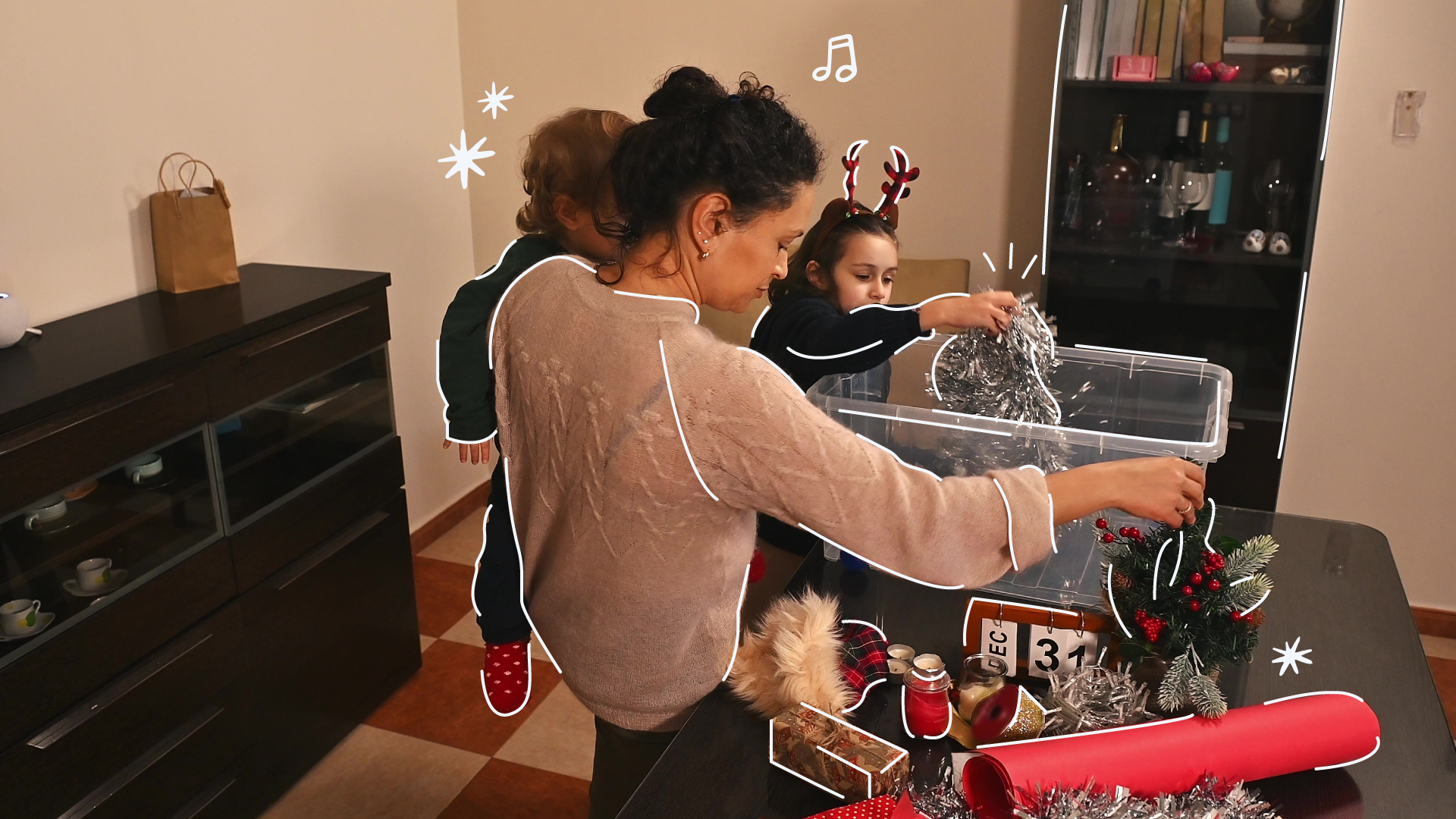For nearly 30 years, first-time homebuyers averaged 30–32 years old, according to Realtor.com, but since 2020, the average age has risen to 38. The rise likely reflects the 2021–2022 buying surge, followed by slower construction, fewer available homes, and tighter finances amid ongoing economic uncertainty.
These shifts reveal deeper affordability challenges, delaying homeownership milestones and prompting new behaviors, like co-buying and planning shared living arrangements, to cope with the rising cost of owning a home. We surveyed 1,012 Americans to understand how these changes impact first-time homebuyers today.
Article takeaways
- The average age of first-time homebuyers has risen to 38, up from 30–32.
- 41% of first-time homebuyers purchase their home between the ages of 25 and 34.
- Only 23% of first-time buyers plan to live alone, while 53% expect to share their home with a partner, family, or roommates.
- About 24% expect it to take longer than 30 years to pay off their mortgage.
- Despite long mortgage terms, 77% feel financially prepared to become homeowners.
55% of Americans Have Bought a House by 35
While national averages suggest the age of first-time buyers is rising, our survey suggests some are still managing to buy younger, with 41% buying by 34, and another 27% by 44. Here’s a closer look at how homebuying habits differ among first-time Gen Z and baby boomer homeowners:
| Age Group | Gen Z | Baby Boomers+ |
|---|---|---|
| 18–24 | 28% | 18% |
| 25–34 | 52% | 46% |
The national average age has increased from around 35 in 2020 to 38 years old in 2025, compared to just 29 in 1981, according to data from Bankrate and the Urban Institute. This shift reflects bigger challenges for today’s buyers, including higher prices and tighter credit.
Still, people are finding creative ways to get into the market earlier than the average by pooling resources, receiving family help, or making compromises on location or home size. While it’s a tougher path than for past generations, the dream of homeownership remains a priority and reality for many, thanks to creative approaches and determination.

Many First-Time Buyers Are Teaming Up To Buy Homes
In the spirit of creativity, many first-time buyers are reshaping modern homeownership through collaborative approaches.
While 53% expect to live with a partner, nearly 23% plan to share their home with roommates or extended family, signaling a shift in what “owning your own place” looks like today. For many, that means learning how to move in with someone new and navigating the challenges of shared living.
Some are co-buying with friends or relatives, while others plan to rent out part of their home to help offset costs. These strategies reflect a growing trend toward creative, flexible ownership models that make homeownership more attainable in a difficult market.
Many buyers are also choosing to live with family longer (23%) or share housing with others (15%) before buying to cut expenses and save for a down payment. This intentional approach highlights how today’s buyers are navigating affordability challenges that previous generations faced less often, using creative strategies to make homeownership possible despite rising costs.

58% of Homebuyers Brace for Mortgages That Span Half Their Adult Lives
The camaraderie involved in co-buying helps many first-time homeowners overcome upfront challenges and also leaves buyers feeling more prepared to take on the long-term financial commitment that comes with owning a home. Yet, many still struggle to navigate the complexities of mortgages.
Many homebuyers find understanding loan options and interest rates stressful, with about 26% saying it’s the toughest part of the process. When it comes to paying off their mortgage, many expect lengthy timelines:
- Nearly 35% expect it will take 21 to 30 years
- About 23% believe it could take more than 30 years
- Around 2% don’t think they’ll ever be able to pay it off

Despite these long horizons, a majority (77%) feel financially prepared to take on the challenge and are committed to making homeownership a reality.
Historically, 30-year mortgages have been the standard in the U.S., with interest rates varying widely, from highs over 18% in the 1980s to lower rates in recent years. However, rising home prices and inflation have made monthly payments more challenging, often leading to “housing shrinkflation,” where buyers get less home for their money as costs increase but budgets remain tight.
This has prompted many buyers to consider longer loan terms or alternative financing options, extending mortgage durations beyond the traditional 30-year mark. Still, first-time homebuyers’ confidence remains strong, reflecting a belief that homeownership is achievable, even if it takes longer to pay off.
Manage Costs With Smart Storage Solutions for Your First Home
With the average age of first-time homebuyers rising due to increasing home prices and tighter budgets, many are choosing smaller homes to make ownership possible.
At the same time, over half of homebuyers want to bring childhood belongings with them into their new space. But with 67% of Americans feeling their homes are cluttered due to limited storage, finding space for what matters most can be a real challenge.
Self-storage offers a flexible and affordable way to manage belongings during and after the moving process. Whether you’re transitioning from a rental to your first home, need extra space during renovations, or want more time to decide which items to keep, storage helps make homeownership more manageable, without the pressure to give up what matters most.

A flexible and affordable way to manage belongings
Find Storage Units Near YouMethodology
The survey of 1,012 adults ages 18 and over who own homes or are looking to buy a home was conducted via SurveyMonkey Audience for SelfStorage.com, LLC on June 2, 2025. Data is unweighted, and the margin of error is approximately +/-3% for the overall sample with a 95% confidence level.
Of the 1,012 survey respondents, 759 currently own or have previously purchased a house. Survey data regarding first-time homebuyers and homeowners reflects the responses of this subset of participants.
Data on the average age of first-time homebuyers and related costs was gathered from Bankrate, the U.S. Census Bureau, NAR, and the Urban Institute.











